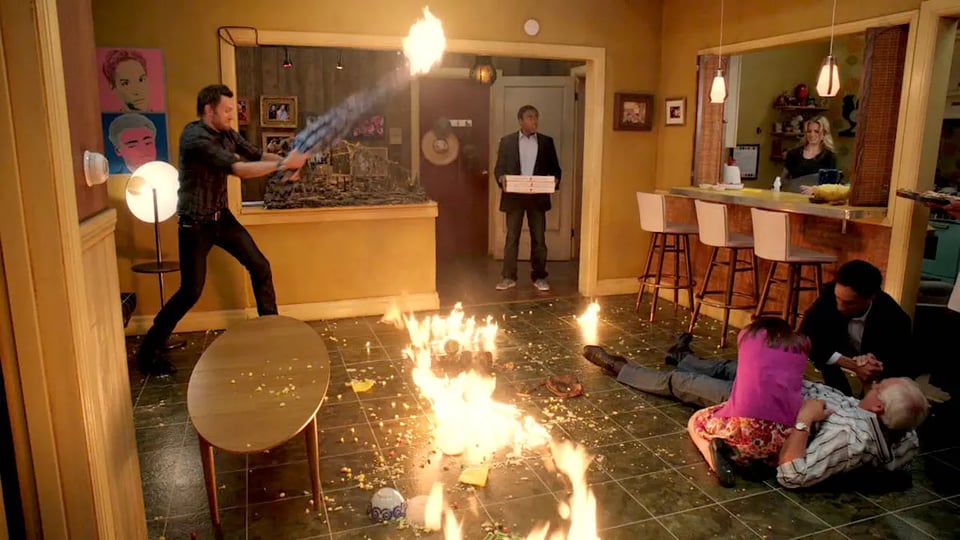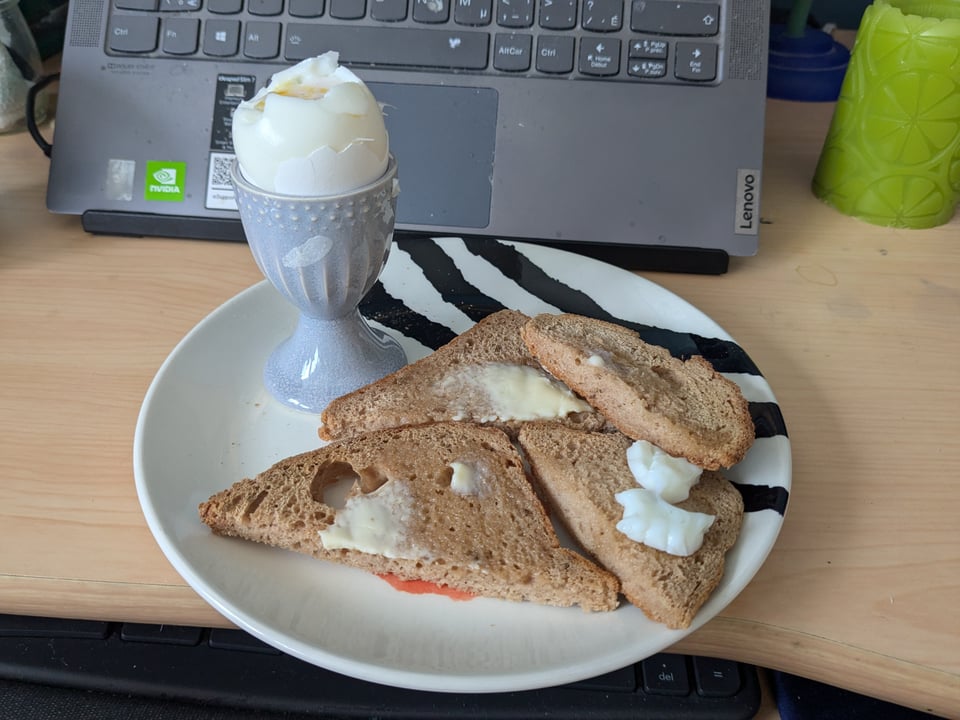fifty-nine: non-utilitarian and doing things for their own sake
Happy newsletter-time belated New Year! I ring you in with a quote from Clive James, in a 2007 interview he did with Stephen Fry that had momentarily dwelled on what education was, or should be. He finishes with: which is practically the definition of humanism. I had just shoveled the last arguably time-sensitive thing off my desk mid-December, slept half a Sunday away in reaction, cooked a big dinner and was flopped on the couch at midnight sleepily bathing in people being both clever and kind, even if it was long ago and far away and on YouTube, when I paused it and went — oh, well. Yes to that.
It struck me as a good holidays mission, to try to remember in my body that feeling of quiet, pleasurable, instinctive aimlessness; just picking up what’s right and good and not what’s urgent or threatening. And then, by the end of the year and actually before that, it struck me as a good mission overall. Which I may have already been doing retroactively for a long while whenever I can manage it. >.> If it’s done for its own sake, going in, you knew it was worth doing, right? I might take that on as a little guiding lens for a while. It makes a marvellous little metaphorical sampler.
(Lagniappe: A 1987 interview with a very young Stephen Fry, Hugh Laurie, and Dawn French where Fry underlines the most important tips for change-making. It’s around two minutes in. I may need it on a sampler too, just a very different sampler. We only revel in juxtaposition.)
what is that you tried to say?
—and of course, like anything you set out to do late December/early January, humanist life pacing spent more time honoured in the breach. You make a promise to yourself, and then oops, all the ways it’s not being kept pop right out. You’re going to find this issue still scattershot, guys. Sorry: there we dwell and live.
At least intellectually, I’ve realized there’s no point in being hard on myself about that. The commitment is the moment of surfacing the habit, not changing it, and definitely not changing the structures and in-flight processes and the habits of people around you to accommodate it.

It really is, I’m thinking, just like learning a writing craft point. You see your failure everywhere for a while before you come to grips with a toolset and a workflow involving the other human beings too, and integrate the whole shebang. Step One is always the valley of the shadow of fucking up and no idea how to fix it. And it was pretty valuable to remember that this is always the quickest way to give myself an intense period of No Fun™, and all I can really do is walk it.
(tl;dr: Watching yourself learn and learn to write over twenty years is a great introduction to CogSci, if you do it firmly committed to not driving yourself insane in the process. Nothing will ever tell you more about how your own neurology works.)
So: let’s be honest about how step one of this very Zen goal was oh shit, now I’ve done it, and two weeks of panic-flailing. Bottoms up.

But that said, and despite the wall-to-wall world chaos, the distinct impression is that in certain ways, nature is healing™. I’m finding people kinder in the streets this month and chatty in the elevator, more casual-sociable. We’re more inclined to smile and talk to strangers. I don’t know if it’s something in my affect ticking over (hey! she’s chosen humanist life pacing! let’s find out more!), or something in the world itself, even though objectively a lot of things just got scarier. In Good Toronto, the kindness is showing its head; I can’t source it but I appreciate it.
Alongside that, I find I’m experiencing the semi-death of the social web as — almost a form of relief. (This was a whole section slated to go below; it outgrew itself into half an essay, and may be an essay somewhere else, or a later instalment. We’ll see.) Dropping spontaneous unpolished notes into people’s inboxes is a form of care that’s taking. Bringing a jar of September’s harissa batch to the new neighbours as a hello gift is a mode where I can exist. It’s a lot of work, trying to do good faith in the performance machine; it’s so much easier to do it when you step out.
So: We’re getting there. Spending most of a Sunday afternoon at the Repair Cafe with a coffee, reading Oliver Burkeman, chatting with the other people in line (student climate organizer, genderqueer furry digital sculptor, retired lady who I’m pretty sure was just there for the company) was just about the shape of it. So was my MPP’s New Year’s Levee, where they literally didn’t just do some general without-gluten snacks for me, they made a special container and put it aside (this is maximum niceness). A lot of this month has been showing up to this rather than that. It’s much less hungry and transactional. We can do things for each other. I think that may well be the key. Out here, we’ve got hands.
book learning
I started both my Urban Food Security and my Society for Poetic Computation course the second week of January, and delightfully, they fit together like bits of the same puzzle. Today we’re gonna talk about systems.
The food security course is, for the first time, being taught by some different instructors — one of them someone I’ve cited and am glancingly acquainted with through one of their advocacy projects. So far, so delicious. We love a course readings list with Kropotkin and solarpunk and Victorian notions of the planned utopian city on it. It’s been a long time since a weekly reading list gave me bodily joy — and the distinct impression that if I go full blast here I won’t be looked at funny.
SFPC is likewise turning out to be space where I can firehose without limitation and soak up the delicious results of smart people firehosing.

It’s a little more mired in that very modern-American form of binaries as a presumed starting point, but tends to loosen up nicely about halfway through class if people get caught up enjoying each other for a minute. I haven’t coded in years and it’s awkward in my hands now. I have hopes. Anytime I’m in a room with people doing the kinds of things other people I know mostly write about, I’m in the right company.
They’re both proving a reminder to think in movement, both meanings intended: kinesis but also that the breaths and threads of this stuff I’m doing in my silly cold apartment and my silly pajamas and my mortal body go back long and far, and that the systems I’m trying to learn how to work with have been experimenting themselves into being for centuries. Work, love, persistence, patience. My instincts on organizing work are probably sound after all: that the most important thing might be the ability to put your ear to the wall of a system and listen which way it’s rumbling, and think responsively with that.
It’s given me a short string of those days when I want, after all, to be a public intellectual. Although I don’t actually want to be a public intellectual; I’ve seen too much of how people treat anyone they consider public. What we might want here is a private consulting intellectual.

Do let me know if a job comes up for that. I don’t know if I can pull off a cravat but by god I’m willing to try.
santiago de compostela
—as I have officially dubbed the composter. It is indeed, after the Latin, a well-ordered burial ground (for fruit stems and eggshells) and on its way to UNESCO World Heritage status.
When I took this thing on, I didn’t entirely internalize how much of my recycling load was going to vanish too. Toiletpaper rolls? Into the bin. Tissues? Bam. I’m tempted to do a little audit in a few months just to quantify how much I’ve just waste-diverted without really trying.
It’s solved my browns problem of last month rather quickly and elegantly. Apparently aside from untreated paper, egg cartons are usually already-recycled and made of short-chain fibers, which is why they’re hard to recycle again — but means they break down fast. And while I’ve been reusing the same three egg cartons for oh, a zillion years (buy a flat, stock ‘em up, save planet and also money) I know exactly which farmers at the Saturday market are always getting rid of egg cartons. Because I used to take some off their hands for the chili project when we collectively ran low, because Seeds of Hope also saves planet/money with flats.
Turns out I don’t need to steal people’s backyard leaf bags after all, although I still might for sheer entertainment value. Leaf Crime is the kind of person I want to be in this life. ☺️
“i’ve laid politically dormant for about half an hour!” / “that’s not like you.”
(Roger and Val Have Just Got In is in some ways, an absolutely heartbreaking show, but it’s also very, very funny.)
It’s Budget proper this month (the other month was pre-budget consultations) but I decided not to depute this year. I already hit the pregame in November, and when the actual budget dropped, nothing in there gave me a vibrant, shimmering hell no or hell yes. While having been part of pack-the-deputations organized efforts in the past, and understanding their place in terms of building community capacity, it’s not a bad thing, I think, to make yourself a little scarce sometimes. Preserves your actual impact.
What I spent a little more time on was finding the right desk to report a piece of systemic malfeasance: something I tripped over in December (read: gently but firmly elbowed the truth out of somebody and let’s be clear, they were good to give it to me). I’ve not been sleeping well under the possibility that other people haven’t noticed. This is the epitome of what I hated about publishing harassment backchannel politics: too much responsibility in narrow places, limited efficacy, heaps of moral injury for everyone and little change.
So I decided nope, let’s fix that or at least put in an honest effort, and it was a weird and surprising reminder that — oh, wait, no, I still know sensible people in politics. People I ran around City Hall doing nerd stuff with in 2012, or went to high school with, went on to be political staffers or journalists. They were more than happy to pick up a piece of this one the minute I went lateral, and now we might be back on track for a good result? Turns out, I didn’t need to do this alone. It’s weird that one can forget this. Of course I didn’t. How did I get myself convinced of that?
I’m taking it as another symptom that we were all physically apart more than a bit too long. Everyone went too abstract; you forget, instinctively, who was there. Loneliness is an epistemology, and it’s not the only game in town.
That parallel action here put a definite spin on a definition of civil society in my first Urban Food Security readings: “all organizations that occupy the "social space" between the family and the state, excluding political parties and firms.” Yanno, the good shit. Society.
This is, I think, the part of the universe that went down for repairs when COVID showed up, and the part of the universe the Thatcherian mindset doesn’t understand, and which so many of us miss, and so many people in the wake of pandemic lockdowns are treating with a sense of quite personal abandonment and betrayal — and thus trying to punish, in the ways anxiously attached people do for leaving them. Yanno. Society. All the people out there who didn’t come and help when we were terrified.
So I’m settling into another view of all the niceness in the streets, the repair organizations, the structural considerations: Society Calisthenics. All the little actions we can do to remind a body it’s not alone. I’m looking at this into February as almost a teeny-tiny political project: how does the body remember the goodness of being together? Done strictly for non-utilitarian reasons, of course. Being together for its own sake.
thou shalt not make repetitive generic music thou shalt not make repetitive generic music
(I refound this because, as above, buckets of Stephen Fry interviews. Still makes me laugh.)
Writing still does not want to be exposed to semi-public scrutiny (yeah, I know, it’s been a long stretch for that; my brain is clearly working something in the back shed, muttering, in the dark) but some authoring is public and announceable right now.
After a little dithering and short work, I got my League of Canadian Poets membership approved this month. I’ve rarely been a writers’ organizations person, but I came to rigorous poetry work so late that I’m pleased about it in a way I never would have been with something like SFWA.
If you need a poet for hectic! action! or climbing up tall buildings or to come along and say “that’s just like life”, I’m told bookings are now much easier. Member directory lives here.
things watched
Shoutout this month to Bridget Christie’s short series The Change (I am working my way through Taskmaster contestants’ back catalogues), a — I don’t know if I’d call it either a drama or comedy. It’s a short, lightly funny, wry, literary thing of a TV series about a woman who, at 50, looks at all the time she’s spent doing chores and housework for others — and quite literally; she’s timed and kept a ledger for years — and decides to reclaim some of that time by hopping on her old Triumph and going to the Forest of Dean to find the time capsule she left in a tree as a child.
There are many ways this could have been mean, propagandistic, or harsh. I’m not going to pretend it’s at all subtle, but it’s also none of those things. It’s one of the most cohesive and sincere things I’ve seen in a good while: feminist approaches to menopause and losing yourself in your own body integrating with the sheer beauty of this forest and the oddness of the tiny town near it, with gender and racial politics, with loss, and all handled — not lightly, even, but with a profound anti-malice. What it turns out to be (not really a spoiler) is a refracted examination on how we wrestle with change, and it’s shot through with a foundationally thoughtful, sincere willingness to engage with every single person, choice, and situation as complex and irreducible to parts. And it’s still wonderfully funny. It’s doing the thing I’ve been trying to do (arguably, doing? says the voice of a few friends in my head who stick up for me more than I do myself) in my work for years: nuanced, generous, deeply felt, and thinking about something with its whole ass. No shortcuts and yet light on the tongue. Highly recommended.
Likewise, I’m doing a full Jeremy Brett Sherlock Holmes rewatch during and around and between my heaping servings of admin this month. I don’t think I’ve seen them since I was a kid, on Masterpiece Theatre, and I’d say I’m surprised how much I imprinted on them, except I’m not. He’s objectively magnificent to watch: kinetic and charismatic and doing the most with the tiniest expressions, bursting with barely concealed impatience and pleasure and irritation in a way that’s so much more sociable and good-humoured than any post-2001 adaptation (after, I think, masculinity broke a little; comparing this to Sherlock or even Elementary is fathoms deep in what it’s saying about what male awesomeness can or should contain and how much men are allowed to even platonically like each other). I adore the bright, sharp, brief little smiles Brett does as Holmes, and the rapport with both Watsons is vividly good. I love a smart Watson; a relationship of complementary equals who are there because they respect each other and are actually experiencing fun in this life.
I’m on Hound of the Baskervilles. It’s odd watching, knowing how ill Brett was at the end of the series, and seeing the little puffiness in his face from medication reactions. You get the sense of something fragile. I’m thoroughly adoring the work.
things read
One of the things I tried to do this month is slowly nurture my ability to read prose back to health. And Richard Osman’s The Thursday Murder Club was a very good start on that: really rather charming but didn’t stick out one way or the other? It’s a well-plotted, warm, and fairly good-natured thing to read on the couch on a Friday night when you’ve decided you need something well-plotted and warm to read. You can sort of see the roots in author-as-comedian; it’s very discursive, there’s almost no scene-setting or visual information (in a joke, the story is told) and the comic timing is excellent. This may sound underwhelmed; I laughed out loud! multiple times! big hah laughs! It’s a nice book, and on a night I needed a nice book, it did just the right job.
On another axis, it should say something that I’ve meant to read Oliver Burkeman’s Four Thousand Weeks: Time Management for Mortals for, oh, two years now. Including some stints it spent in my house from the library, not being read. It’s fully automated luxury self-sabotage like you’ve never seen before. But when I finally got down to it this month, there was some real concrete value in this one. Sometimes it’s reassuring to understand that your fights with friction and need and ambition and time are actually not special in any way: you are of your generation, you are of your context and systems, ya basic. It quite sincerely takes the pressure off. There is no diagnostic process to be done.
It’s a self-help book, and self-help books can speak more in the language of generalities things that are situations, perspectives, and specifics — I mean, at a certain point you just accept that’s the form and read around them, adapting as you go — and he does work from social assumptions that presume a lot of choice and resources.
I found myself more interested in the invisible assumption: that his particular generational trauma around time (he discusses it quite frankly, it’s not a spoiler), the ever-presence of mortality, and structure applies more broadly than I suspect it really does? He says something very revealing very quietly in this one, and I’m always interested when people do that. It’s frequently where the action is on the whole idea.
Underneath this self-help book about time management is the quiet sliver of a book about grappling with not mortality or finitude, as he’s glossing it, but helplessness. And that was an interesting time, once I’d run the translation. Recommended, if you’re a reader who doesn’t mind the translating.
things to read
Reckoning ebook publication day is always the first Monday of January, which means this year’s edition — and my piece in it, "Biologists say it will take at least a generation for the river to recover (Klamath River hymn)” — are available in ebook now. It’s a poem from the perspective of and in the shape of a river; the title was taken from a 2023 article about the undamming. (Undamning? Lovely.) The ebook’s available for purchase at the link above; the piece hits web release in July; print edition this summer.
Likewise, The Ampersand Review’s Issue #7 is now available, including “my mother asks why i do everything the hard way”, a poem about a real conversation that really happened and older memes and Good Dog Action. (Incidentally, we re-had this conversation this month. I could explain to her, this time, why I do everything the hard way. Progress does happen.) This is the first time that, as a poet, I’ve been the name in the “including poetry from” blurb: small milestone, much cherished.
This was launched at the Mississauga Central Branch library on the 22nd, with readings from eight (!) authors, some in the room, some via Zoom. Given extreme-cold-warning weather and political upheaval, it was a decidedly weird room at the opening bell — you can tell when you walk into a reading if ain’t nobody happy — but lots of interesting work in there at various tones and valences. I’m chasing some people’s backlists up. It’s a neat journal issue.
upcomings
Given the wild degree of oh god, that please I had this month on ecological futurism, I’ve hopped back into this year’s Reckoning editorial hive. Reading a steady stream of climate art with people who love things more than we feared them was making me happy even in desperately unhappy early-pandemic circumstances. So: I’ll be slush-reading again this year (cheers); please feel free to send your most delicious.
if you’re going to do that, lay down plenty of newspaper
The next four weeks don’t look like they’re planning to be any less hectic (final January tally: approximately seven qualitative weeks long) but hopefully the mindful pace will start to take.
Things to look for: At least one new review (I’m pretty sure), possibly something more substantial on that social web thing, possibly better analysis on Holmes once I wind up there, bread, seed starting, activated poetry, research on fruit trees.
Steady on, team. See you in four weeks.